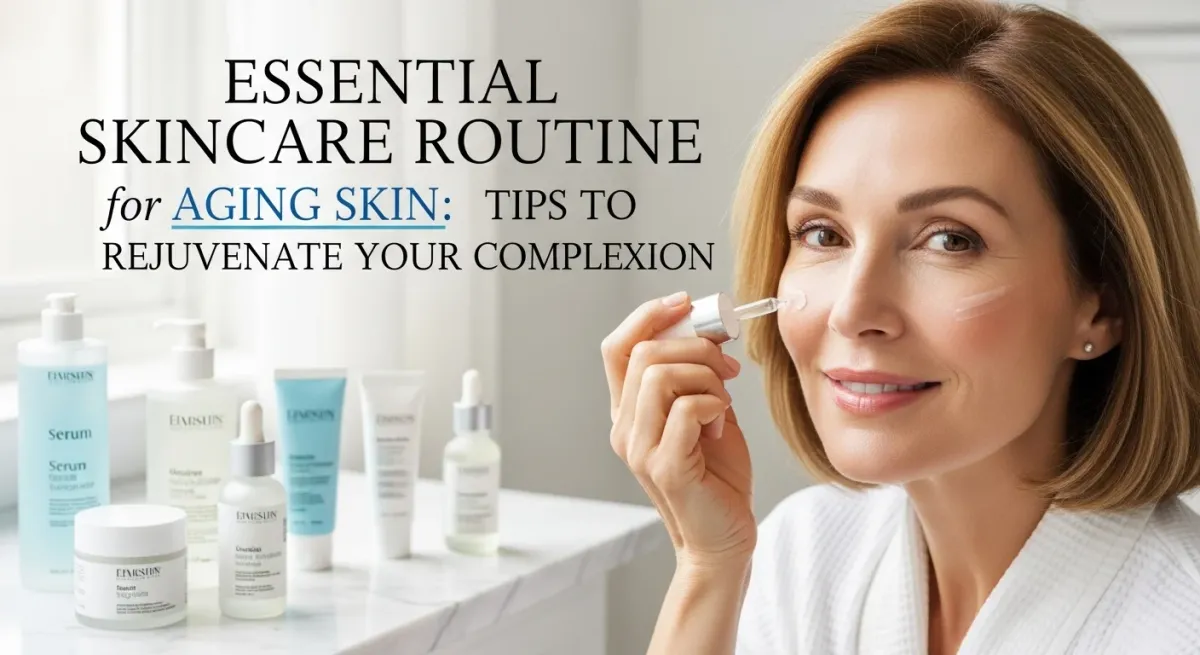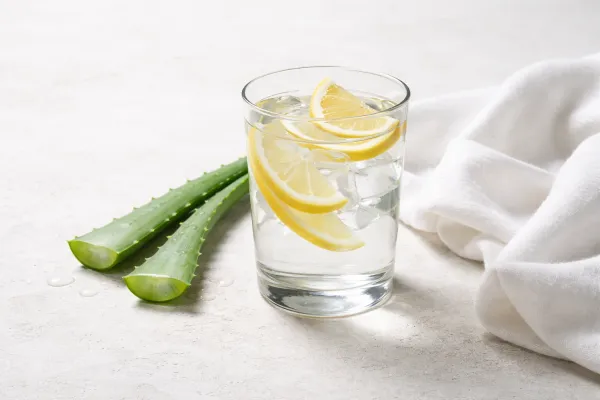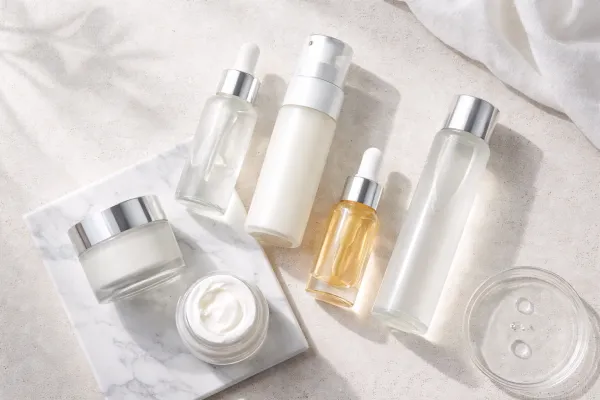Essential Skincare Routine for Aging Skin: Tips to Rejuvenate Your Complexion
Discover essential tips for a skincare routine that rejuvenates aging skin and promotes a youthful complexion.

As we age, our skin undergoes numerous changes that can affect its appearance and health. To maintain a youthful glow, it is essential to adopt a consistent skincare routine tailored for aging skin.
This article will guide you through the necessary steps and tips to rejuvenate your complexion, ensuring your skin remains vibrant and healthy.
Key Takeaways
- Aging skin requires gentle cleansing to remove impurities without irritation.
- Regular exfoliation helps eliminate dead skin cells, promoting a smoother appearance.
- Hydration is crucial; use moisturizers that lock in moisture and combat dryness.
- Incorporate serums with vitamins and antioxidants for targeted anti-aging benefits.
- Daily sun protection is essential to prevent further skin damage and aging.
Understanding the Aging Process
Aging is something we all go through, and it’s pretty fascinating how our skin changes over time. As we age, our skin undergoes various transformations that can affect our appearance and how we feel about ourselves.
Let’s break it down a bit.
How Skin Changes Over Time
Our skin is like a canvas that tells the story of our lives. Here are some key changes we notice:
- Fine lines and wrinkles: These often pop up first, especially around our eyes and mouth.
- Dullness: Our skin can start to look a bit lackluster, losing that youthful glow.
- Dry skin: As we get older, our skin produces less oil, leading to dryness.
Common Signs of Aging Skin
We might see a few telltale signs as we age:
- Age spots: These dark spots can appear on sun-exposed areas like our hands and face.
- Rough texture: Our skin may feel less smooth and more uneven.
- Sagging: Loss of collagen can lead to sagging skin, especially around the jawline.
Factors That Accelerate Aging
While aging is natural, some things can speed it up:
- Sun exposure: UV rays can cause premature aging, so wearing sunscreen is key.
- Smoking: This habit can lead to a dull complexion and more wrinkles.
- Poor diet: Eating unhealthy foods can affect our skin’s health.
Remember, aging gracefully involves a combination of lifestyle choices, a diligent skincare routine, and, when necessary, aesthetic treatments. It’s never too early or too late to start taking care of our skin!
By understanding these changes, we can better adapt our skincare routines to keep our skin looking its best. Let’s embrace the journey and make the most of it!
Importance of a Consistent Skincare Routine

When it comes to taking care of our skin, consistency is key. We all want that youthful glow, right? Well, sticking to a regular skincare routine can help us achieve just that.
Here’s why it matters:
Why Consistency Matters
- Builds a Habit: Just like brushing our teeth, a daily skincare routine becomes second nature over time.
- Better Results: Our skin needs time to adjust and respond to products. Skipping days can slow down progress.
- Prevents Issues: Regular care helps us avoid problems like dryness or breakouts.
Building Healthy Habits
- Set a Schedule: Try to do your routine at the same time every day, like morning and night.
- Keep It Simple: Start with the basics—cleanser, moisturizer, and sunscreen. We can add more steps later.
- Stay Committed: Even on busy days, a quick wash and moisturizer can make a difference.
Long-Term Benefits
- Youthful Appearance: Over time, our skin can look smoother and more vibrant.
- Boosted Confidence: When our skin looks good, we feel good!
- Healthier Skin: A consistent routine can help our skin stay resilient against aging and environmental stressors.
Remember, skincare is a journey, not a race. It takes time to see results, so let’s be patient and stick with it!
Cleansing for Mature Skin

When it comes to taking care of our skin as we age, cleansing is a super important first step.
A good cleanser can make all the difference!
It helps remove dirt, makeup, and oils without stripping our skin of its natural moisture.
Here’s what we need to know:
Choosing the Right Cleanser
- Look for a mild and non-irritating cleanser. We want something that cleans without leaving our skin feeling tight or dry.
- Consider options like hydrating cleansers that contain ingredients such as ceramides and hyaluronic acid. These help keep our skin barrier intact.
- Check out the 12 best cleansers for mature skin in 2024 to find the right fit for us!
How Often to Cleanse
- We should aim to cleanse our face twice a day: once in the morning and once before bed. This helps keep our skin fresh and ready for the next steps in our routine.
- If we wear makeup, it’s especially important to cleanse at night to remove all traces of products.
Tips for Effective Cleansing
- Use lukewarm water instead of hot water, which can be drying.
- Gently massage the cleanser into our skin using circular motions. This helps boost circulation!
- Rinse thoroughly and pat our skin dry with a soft towel. Avoid rubbing, as it can irritate our skin.
Remember, cleansing is just the beginning of our skincare journey. Taking care of our skin is a daily commitment that pays off in the long run!
Exfoliation: A Key Step
Benefits of Exfoliating
Exfoliating is super important for keeping our skin looking fresh and vibrant. It helps remove dead skin cells and promotes new cell growth, which can lead to a smoother and brighter complexion. Here are some benefits we can enjoy from regular exfoliation:
- Smoother skin texture
- Brighter complexion
- Better absorption of skincare products
Types of Exfoliants
When it comes to exfoliating, we have a couple of options:
- Physical Exfoliants: These are scrubs or brushes that physically remove dead skin. Just be gentle!
- Chemical Exfoliants: These use acids like glycolic or salicylic acid to dissolve dead skin cells. They’re often gentler and can be more effective.
How to Exfoliate Properly
To get the most out of our exfoliation routine, we should follow these simple steps:
- Choose the right product for our skin type.
- Start slow: Exfoliate once or twice a week and see how our skin reacts.
- Don’t overdo it! Too much exfoliation can irritate our skin.
Remember, exfoliation is just one part of our skincare routine. It’s essential to follow up with hydration and protection to keep our skin healthy and glowing!
Hydration and Moisturizing
Importance of Hydration
Staying hydrated is super important for our skin, especially as we get older. Hydrated skin is healthy skin, and it can really help us look younger!
As we age, our skin tends to produce less oil, which can lead to dryness. So, adding a good moisturizer to our routine is key to keeping our skin looking fresh and plump.
Best Moisturizers for Aging Skin
When picking a moisturizer, we should look for ones that contain ingredients like:
- Hyaluronic acid: This helps to draw moisture into the skin.
- Ceramides: These help to restore the skin barrier and keep moisture locked in.
- Vitamin C: This can brighten our complexion and fight off free radicals.
Here’s a quick table of some great options:
Product Name | Key Ingredients | Skin Type |
|---|---|---|
CeraVe Hydrating Facial Cleanser | Ceramides, Hyaluronic Acid | Normal to Dry Skin |
Skin Renewing Vitamin C Serum | Vitamin C, Hyaluronic Acid | All Skin Types |
Skin Renewing Day Cream | SPF, Ceramides | All Skin Types |
Hydration Tips and Tricks
To keep our skin hydrated, we can follow these simple tips:
- Drink plenty of water throughout the day.
- Use a humidifier in our home, especially during dry months.
- Apply moisturizer right after cleansing to lock in moisture.
Remember, a good moisturizer for mature skin will contain both humectants (like hyaluronic acid) and lipids (like ceramides). This combo is essential for keeping our skin looking youthful!
Incorporating Anti-Aging Serums
Choosing the Right Serum
When it comes to anti-aging serums, we want to pick the right one for our skin. Here are some key ingredients to look for:
- Vitamin C: Brightens and evens out skin tone.
- Retinol: Helps reduce wrinkles and fine lines.
- Hyaluronic Acid: Keeps our skin hydrated and plump.
How to Apply Serums
Applying serums is super easy! Just follow these steps:
- Cleanse your face first.
- Apply a few drops of serum to your fingertips.
- Gently pat it onto your skin, focusing on areas with signs of aging.
- Let it absorb before moving on to moisturizer.
Popular Ingredients to Look For
Here’s a quick table of some popular anti-aging ingredients and their benefits:
Ingredient | Benefit |
|---|---|
Vitamin C | Brightens skin |
Retinol | Reduces wrinkles |
Peptides | Improves skin texture |
Niacinamide | Reduces redness and dark spots |
Antioxidants | Protects against free radicals |
Remember, consistency is key! Using serums regularly can really help improve our skin's appearance over time.
So, let’s not forget to incorporate these amazing serums into our routine. They can make a big difference in how our skin looks and feels!
Sun Protection is a Must

Why Sunscreen is Essential
We all know that sunscreen is our best friend when it comes to protecting our skin. It’s not just for beach days! We should be using it every single day, rain or shine. Those sneaky UVA rays can still cause damage even when it’s cloudy.
So, let’s make it a habit to slather on that sunscreen before heading out.
Best Sunscreens for Aging Skin
When picking a sunscreen, we want to look for:
- Broad-spectrum protection
- SPF 30 or higher
- Water resistance
Here’s a quick table to help us choose:
Type of Sunscreen | Pros | Cons |
|---|---|---|
Chemical | Lightweight, easy to apply | Can irritate sensitive skin |
Mineral | Gentle, good for sensitive skin | Can leave a white cast |
Spray | Convenient for reapplication | May not cover evenly |
Daily Sun Protection Tips
To keep our skin safe, here are some tips:
- Reapply every two hours—especially if we’re sweating or swimming.
- Wear protective clothing like hats and sunglasses.
- Seek shade whenever possible, especially during peak sun hours.
Remember, taking care of our skin today means we’ll thank ourselves tomorrow!
Diet and Lifestyle for Healthy Skin

Foods That Benefit Your Skin
Eating right is super important for keeping our skin looking fresh and vibrant. Here are some foods we should consider adding to our plates:
- Avocado: Packed with healthy fats that keep our skin moisturized.
- Salmon: Rich in omega-3 fatty acids, which help reduce inflammation.
- Fruits and Veggies: Colorful options like berries and spinach are full of antioxidants that fight aging.
Importance of Hydration
Staying hydrated is key! Drinking enough water helps our skin stay plump and reduces dryness. Aim for at least 8 glasses a day. If plain water isn’t your thing, try herbal teas or infused water with fruits for a tasty twist.
Healthy Lifestyle Choices
Making smart choices in our daily lives can really boost our skin health. Here are some tips:
- Get Enough Sleep: Sleep is when our body repairs itself, including our skin.
- Manage Stress: Stress can lead to breakouts and dull skin, so finding ways to relax is crucial.
- Avoid Smoking: Smoking can make our skin look older and duller.
Remember, healthy skin starts from the inside out! A balanced diet and a good lifestyle can make a huge difference in how our skin looks and feels.
7-Day Meal Plan for Healthy Skin
To help us get started, here’s a quick look at a 7-day meal plan for healthy skin:
Day | Breakfast | Lunch | Dinner |
|---|---|---|---|
Monday | Oatmeal with berries | Quinoa salad | Grilled salmon |
Tuesday | Smoothie with spinach | Lentil soup | Stir-fried veggies |
Wednesday | Avocado toast | Chicken wrap | Baked sweet potatoes |
Thursday | Yogurt with nuts | Spinach salad | Fish tacos |
Friday | Chia pudding | Veggie burger | Pasta with tomato sauce |
Saturday | Fruit salad | Hummus and veggies | Grilled chicken |
Sunday | Whole grain pancakes | Quinoa bowl | Stir-fried tofu |
This meal plan incorporates anti-inflammatory foods like avocado, salmon, and nutrient-rich fruits and vegetables to improve skin from the inside out!
Professional Treatments to Consider

When it comes to giving our skin a little extra love, professional treatments can be a game changer. These treatments can help rejuvenate our complexion and tackle those pesky signs of aging.
Here’s a quick look at some options we might want to consider:
Popular Anti-Aging Treatments
- Botox: This is a popular choice for smoothing out deep wrinkles and fine lines. It’s quick and can make a noticeable difference!
- Laser Skin Resurfacing: This treatment helps to improve skin texture and tone by removing the outer layer of skin. It’s great for reducing scars and sun damage.
- Chemical Peels: These can help with uneven skin tone and texture by removing dead skin cells and promoting new cell growth.
How to Choose a Professional
- Research: Look for licensed professionals with good reviews.
- Consultation: Schedule a consultation to discuss your skin concerns and treatment options.
- Ask Questions: Don’t hesitate to ask about their experience and the expected results.
What to Expect During Treatments
- Preparation: Some treatments may require prep work, like avoiding certain products.
- Procedure: Most treatments are quick, but some may require downtime.
- Aftercare: Follow any aftercare instructions to ensure the best results.
Remember, investing in our skin is investing in ourselves! Taking the time to explore these options can lead to a more radiant and youthful appearance.
By considering these professional treatments, we can enhance our skincare routine and tackle aging head-on!
Common Skincare Mistakes to Avoid
When it comes to taking care of our skin, we all want to do it right. But sometimes, we slip up! Here are some common mistakes we should definitely avoid:
Over-Exfoliating
Exfoliating is important, but too much can harm our skin. We might think that scrubbing away dead skin will give us a glow, but it can actually lead to irritation.
Here’s a quick list of what to keep in mind:
- Exfoliate 1-2 times a week.
- Choose gentle exfoliants like glycolic acid.
- Listen to your skin; if it feels sore, cut back!
Skipping Sunscreen
We all know that sunscreen is a must, yet many of us forget it. Not using sunscreen can lead to premature aging.
Here’s why we should never skip it:
- Protects against harmful UV rays.
- Helps prevent dark spots and wrinkles.
- Use a broad-spectrum sunscreen with at least SPF 30.
Using Too Many Products at Once
Sometimes, we get excited and want to try everything at once. But layering too many products can confuse our skin. Here’s a simple approach:
- Start with a cleanser.
- Add a moisturizer.
- Introduce new products one at a time.
Remember, skincare is a journey, not a race! Let’s give our skin time to adjust to new products.
By avoiding these common mistakes, we can keep our skin looking fresh and youthful. Let’s take care of our skin together!
Adapting Your Routine Over Time
As we age, our skin changes, and so should our skincare routine. It’s important to pay attention to what our skin needs at different stages of life.
Here’s how we can adapt our routine:
When to Change Your Routine
- Age Milestones: As we hit our 30s, 40s, and beyond, our skin may need different products.
- Seasonal Changes: Our skin can react differently in summer versus winter, so we might need to switch things up.
- Skin Changes: If we notice dryness, oiliness, or breakouts, it’s time to reassess our products.
Signs Your Skin Needs a Change
- Increased dryness: If our skin feels tight or flaky, it might be time for a richer moisturizer.
- New breakouts: This could mean our current products are too heavy or not suitable anymore.
- Loss of elasticity: If we’re seeing more fine lines, we might want to add a serum with retinol or hyaluronic acid.
Tips for Transitioning Products
- Introduce slowly: When trying new products, add them one at a time. This way, we can see how our skin reacts.
- Give it time: It can take a few weeks to notice changes, so patience is key.
- Consult a pro: If we’re unsure, talking to a dermatologist can help us find the right products for our skin type.
Remember, adapting our skincare routine is a journey. We should listen to our skin and adjust as needed. It’s all about finding what works best for us!
Wrapping It Up: Your Path to Radiant Skin
So there you have it!
Taking care of aging skin doesn’t have to be a big hassle. Just remember to keep it simple and stick to the basics: cleanse, moisturize, and protect your skin from the sun.
With a little patience and the right products, you can help your skin look fresh and youthful.
Don't forget, consistency is key! Make this routine a part of your daily life, and soon enough, you’ll notice a brighter, healthier complexion.
Cheers to glowing skin!
Frequently Asked Questions
What changes happen to our skin as we age?
As we get older, our skin loses elasticity, which can lead to wrinkles and sagging. We may also notice age spots and dryness. As we age, the skin barrier weakens naturally, leading to: Increased skin sensitivity and dryness, Greater vulnerability to UV-related skin damage, Reduced ability to retain moisture. UVA rays (or aging rays) can prematurely age your skin, causing wrinkles and age spots, and can pass through window glass. Incorporating barrier-strengthening products can slow the visible effects of skin aging. Sunscreen can also help prevent premature skin aging, such as wrinkles and age spots, caused by too much unprotected UV exposure.
Why is it important to have a regular skincare routine?
A consistent skincare routine helps keep your skin healthy and can slow down the aging process. It builds good habits for long-term skin care. To reap the benefits of a good skincare routine, it's essential to stick to it and practice it daily while following the proper order of a skincare routine. A consistent skincare routine is always best. Consistency is key when it comes to seeing results from acne treatments. It's about taking a holistic approach to your health and well-being. Besides using the right moisturizer, several lifestyle factors can support barrier repair. Consistency and patience are key. Results can vary depending on the severity of the barrier damage and the specific product used. Some people may notice improvements within days, while others may take several weeks.
How should I choose a cleanser for mature skin?
Look for gentle cleansers that hydrate your skin. Avoid harsh soaps that can dry out your skin. Different cleanser types cater to specific needs: Cream Cleansers are recommended for dry or sensitive skin, providing moisturizing and soothing benefits. Gentle cleansers are ideal for daily use, especially for dry or sensitive skin, as they protect the skin's natural barrier. It's best to wash your face twice a day with a gentle, oil-free cleanser. Over-cleansing can actually lead to increased oil production. Wash your face daily and after exercise. Because regular bar soap often contains harsh ingredients that can be drying to the skin, wash your face with a mild facial cleanser and lukewarm — not hot — water. Avoid harsh cleansers and over-exfoliation.
What are the benefits of exfoliating?
Exfoliating removes dead skin cells, making your skin smoother and brighter. It helps new skin cells come to the surface. Exfoliate 2-3 times a week to remove dead skin cells and keep your skin fresh. Limit exfoliation to 2-3 times a week. Over-exfoliating can cause redness, dryness, and increased breakouts. Opt for gentle chemical exfoliants rather than harsh physical scrubs. It depends on your skin type and the type of exfoliant you're using. Generally, 1-3 times per week is a good starting point. If you have sensitive skin, start with once a week and gradually increase as tolerated. Avoid over-exfoliating, which can cause irritation. Harsh exfoliating, whether with physical scrubs or chemical exfoliants, can strip away the skin barrier, leading to dryness, irritation, and increased sensitivity. It's like taking a sandblaster to your skin's protective wall. Exfoliate gently and in moderation, no more than 1-2 times per week.
How can I keep my skin hydrated?
Drink plenty of water and use moisturizers that contain ingredients like hyaluronic acid to lock in moisture. What's the Difference Between Hydration and Moisturization, and Why Do I Need Both? Hydration is about increasing the water content of your skin, while moisturization is about preventing that water from escaping. Think of it like this: hydration is like filling a bucket with water, and moisturization is like putting a lid on it to keep the water from evaporating. Hyaluronic acid is a great hydrator, while ceramides, fatty acids, and occlusive ingredients like shea butter and dimethicone help to moisturize and seal in that hydration. You need both for optimal skin barrier repair. While your diet won't directly alter your skin's pH, it can impact your overall health, which in turn affects your skin. Staying hydrated by drinking plenty of water is also crucial. Besides using the right moisturizer, several lifestyle factors can support barrier repair: Hydration: Drink plenty of water.
What should I look for in an anti-aging serum?
Choose serums with ingredients like vitamin C or retinol, which help reduce wrinkles and improve skin texture. Serums are concentrated products that target specific skin concerns like dryness or aging. Serums are a skincare routine favorite, and many contain antioxidants or active ingredients to help hone in on a specific function. You can use serums morning and night, depending on their ingredients. For example, retinol serums are reserved for nighttime use, while vitamin C serums work well during the day. After toning, but before moisturizing, you want to layer on a skincare serum. Always wait for it to fully absorb before moving on to the following skincare routine step, targeted treatments, like retinol and spot treatments, and can be used morning and night depending on their ingredient list. It's best to start with thin, water-based products like toners and ampoules, followed by thicker ones like moisturizers and oils.
Why is sunscreen important for aging skin?
Sunscreen protects your skin from harmful UV rays that can cause premature aging and skin damage. Everyone. Sunscreen use can help prevent skin cancer by protecting you from the sun's harmful ultraviolet (UV) rays. Anyone can get skin cancer, regardless of age, gender, or skin tone. In fact, it is estimated that one in five Americans will develop skin cancer in their lifetime. Sunscreen can also help prevent premature skin aging, such as wrinkles and age spots, caused by too much unprotected UV exposure. UVA rays (or aging rays) can prematurely age your skin, causing wrinkles and age spots, and can pass through window glass. You should apply sunscreen every day on skin not covered by clothing if you will be outside. The sun emits harmful UV rays year-round. Even on cloudy days, up to 80% of the sun's harmful UV rays can penetrate the clouds. Visible light from the sun can increase skin darkening, also known as hyperpigmentation, particularly for people with darker skin tones. To protect yourself from visible light, seek shade, wear sun-protective clothing, and apply a broad-spectrum sunscreen that says "tinted" on the label and has an SPF of 30 or higher.
What lifestyle changes can help my skin stay healthy?
Eating a balanced diet, staying hydrated, getting enough sleep, and avoiding smoking can all improve your skin's appearance. Your lifestyle choices can make or break your skin barrier. Besides using the right moisturizer, several lifestyle factors can support barrier repair: Sleep: Get 7-9 hours of quality sleep per night, Stress Management: Practice stress-reducing techniques like meditation or yoga, Healthy Diet: Eat a balanced diet rich in omega-3 fatty acids, Hydration: Drink plenty of water, Humidifier: Use a humidifier, especially in dry climates, Avoid Irritants: Minimize exposure to known irritants and allergens. A diet rich in whole, healthy foods provides your skin with the nutrients it needs to repair itself. Conversely, a diet high in processed foods, sugar, and unhealthy fats can contribute to inflammation and weaken your skin barrier. While your diet won't directly alter your skin's pH, it can impact your overall health, which in turn affects your skin. Staying hydrated by drinking plenty of water is also crucial.




